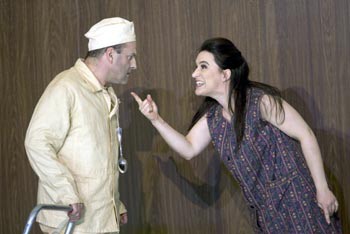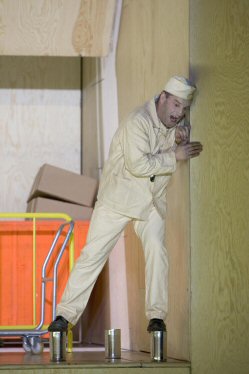|
Editor: Marc Bridle
Webmaster: Len Mullenger
|
Seen and Heard Opera Review
Confident mottos then, for a confident enterprise.
The 1900 seat Donald Gordon auditorium (a shared facility for opera,
dance and other theatre) provides WNO with the technical resources
and the space needed to expand its already formidable reputation
at long last. And after having devised a bold new pricing strategy
for opera performances there - the maximum seat price is £35
and some cost as little as a fiver - the company chose Wozzeck
for its first new production rather than something safer. Omens
for the future really don't come much better than this these days,
because this is a marvellous production.
Directed by Richard Jones, this co-production with Berlin’s Komische Oper realises Büchner's pre-Marxian critique of society appropriately bleakly but also with a good deal of grim humour. Wozzeck is factory worker rather than an army conscript, whose senseless and poverty stricken existence forces him into servitude and exploitation by people obsessed by an amoral and mindless acceptance of consumerism. The mindlessness though is particularly important because, influenced by RD Laing's anti-psychiatry movement of the 1960s and 70s, Jones also takes the view that almost everyone else in Wozzeck's world (with the possible exception of Marie) is mad or nearly so, despite occupying positions of power.
Within this Laingian context, Wozzeck's paranoia is shown not only as an understandable response to his mad surroundings but as the only sane and existentially authentic way to deal with them. Elected (so to speak) as a scapegoat by the near-psychotic Doctor, by the angst-ridden Captain and by the psychopathic Drum Major, Wozzeck 'eats his beans' as ordered by the Doctor faithfully (and frequently in this production) and also carries out the Doctor's senseless experiments. His descent into murder and 'accidental' suicide provides the others with a convenient psychological defence that allows them to deceive themselves about their own mental aberrations. In the final scene, a chilling epilogue to the whole drama is shown when Wozzeck's child inherits his father's only possession (a spoon) and solemnly opens a can of beans too.
And so was the music itself. It is difficult to speak too highly of Vladimir Jurowski's reading of this difficult score. The music was warmly melodious where appropriate, often remarkably beautiful and always so clear that the various stylistic allusions that the score contains were unusually apparent. Once again Mr Jurowski brought something very special to WNO to which his orchestra, the soloists and the chorus responded with enthusiastic commitment.
Christopher Purves as Wozzeck was ideally cast
with exactly the right baritone sound for his demanding role while
Gun-Brit Barkmin's warm and flexible singing made her an attractive
and believable Marie. Sprechstimme presented none
of its customary difficulties for any of the cast and as the Captain,
Peter Hoare ( a fine Bacchus in last season's Ariadne auf Naxos)
gave another excellent performance. Equally effective were Clive
Bayley as the nearly-psychotic Doctor and Peter Svenson as a particularly
malevolent Drum Major. The WNO chorus (trained as usual by Donald
Nally) were better than ever - and they are usually extremely fine.
Bill Kenny
Pictures: Wales Millennium Centre © Neil Bennett
Wozzeck Pictures: © Bill Cooper, February 2005
Back to the Top Back to the Index Page |
| ||
|
||||






